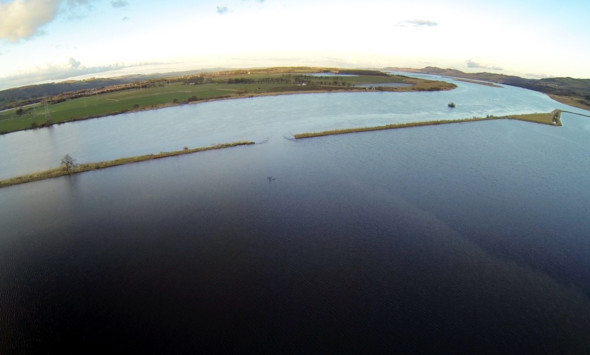Repairing the damage done to the river banking at Easter Rhynd will be no easy task.
David Hay, who farms nearly 5,000 acres of owned, rented and contract farmed land from his base at Easter Rhynd said he had looked at a number of alternatives including bringing in material by barge.
He and son Finlay have now decided they will use clay from the farm as a repair material and will mimic the method used to construct the original dyke in the 1850s.
“They drove stakes into the silt and then used a light railway to cart carse clay from elsewhere on the farm to build the banking.
“What we plan to do is wait for low tides and low water levels in the Tay in May or June and then use a digger on each side of the 50-metre breach to drive in telegraph poles in two rows about four metres apart.
“Then we will fill in the gap between the two rows of poles with yellow clay,” Mr Hay said.
It will be a case of stripping off the top soil on a higher field a few hundred metres from the breach to access the heavy yellow subsoil, which will then be carted on tracked dump trucks to the breach.
Mr Hay continued: “It won’t be easy because we will need to fill in the last gap between high tides or the material might just be washed away.”
Once the area between the two rows of poles has been filled it will be a case of rebuilding the banking to a suitable height and width. The best estimate at the moment is that around 7,200 cubic metres of material will be needed.
The cost is unknown, as is the extent to which topsoil and nutrients have been lost from the 140 acres which has been flooding to a height of 10ft twice a day at high tide.
NFU Scotland president Nigel Miller was at Easter Rhynd and said: “Farmland sits low down on the list of priorities when it comes to discussing flood defences but, given the risk that flooding now poses for some of our prime agricultural land, its importance must increase if we are to be serious about production and natural resources.
“We hope to meet Environment Minister Paul Wheelhouse and will present him with case studies from many areas where flooding is having an impact on farmland and where resilience measures are needed with urgency.
“NFUS is also funding an independent expert in flood prevention to assess what defences and engineering may provide solutions.”
